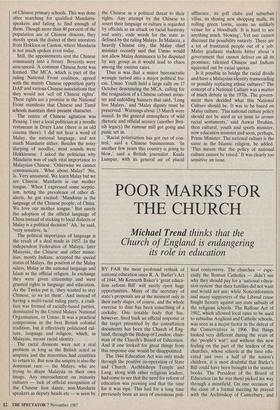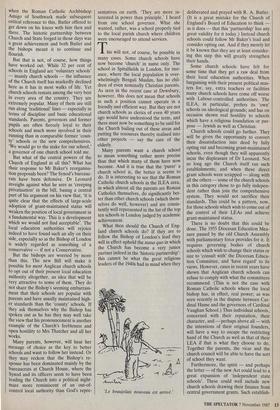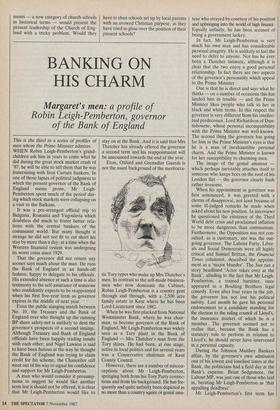POOR MARKS FOR THE CHURCH
Michael Trend thinks that the
Church of England is endangering its role in education
BY FAR the most profound rethink of national education since R. A. Butler's Act of 1944, Mr Kenneth Baker's 'great educa- tion reform Bill' will surely open huge opportunities. Many of the secretary of state's proposals are at the moment only in their early stages, of course, and the whole exercise to date has been something of a cockshy. One notable body that has, however, fired back an official response at the target presented by the consultation documents has been the Church of Eng- land, through the Bishop of London, chair- man of the Church's Board of Education. And if one looked for great things from this response one would be disappointed.
The 1944 Education Act was only made through the positive co-operation of State and Church. Archbishops Temple and Lang, along with other religious leaders, had come to see that the need for reform of education was pressing and that the time for it was ripe. This had for a long time previously been an area of enormous poli- tical controversy. The churches — espe- cially the Roman Catholics — didn't see why they should pay for a 'national educa- tion system' that their families did not want and would not use; while Nonconformists and many supporters of the Liberal cause fought fiercely against any state subsidy of the religious schools. The Balfour Act of 1902, which allowed local rates to be used to subsidise Anglican and Catholic schools, was seen as a major factor in the defeat of the Conservatives in 1906. But things looked very different during the years of the 'people's war'; and without this new feeling on the part of the leaders of the churches, whose schools at the time edu- cated just over a half of the nation's children, it is most doubtful that Butler's Bill could have been brought to the statute books. The President of the Board of Education (as he was then) picked his way through a minefield. On one occasion at the close of a formal meeting he prayed with the Archbishop of Canterbury; and when the Roman Catholic Archbishop Amigo of Southwark made subsequent critical reference to this, Butler offered to get down on his knees with him then and there. The historic partnership between Church and State forged in those days was a great achievement and both Butler and the bishops meant it to continue and flourish.
But that is not, of course, how things have worked out. While 32 per cent of schools in England are 'voluntary schools' — mainly church schools — the influence of the Church itself has markedly declined here as it has in most walks of life. Yet church schools remain among the very best in every area of the country. They are extremely popular. Many of them are still run along 'traditional' lines — especially in terms of discipline and basic educational standards. Parents, governors and former pupils are often fiercely loyal to their schools and much more involved in their running than in comparable former 'coun- ty' schools or the new comprehensives. `We would go to the stake for our school,' a governor of one church school told me.
But what of the central powers of the Church of England in all this? What has their response to Mr Baker's reorganisa- tion proposals been? The Synod's bureauc- rats have been defensive. Dr Leonard inveighs against what he sees as 'creeping privatisation' in the bill, basing a central part of his argument on his view that, 'it is quite clear that the effects of large-scale adoption of grant-maintained status will weaken the position of local government in a fundamental way. This is a development which we would not find acceptable'. The local education authorities will rejoice indeed to have found such an ally on their side, especially so as the Bishop of London is widely regarded as something of a conservative — if not a Conservative.
But the bishops are worried by more than this. The new Bill will make it possible for most Anglican church schools to opt out of their present local education authority altogether, an idea that will be very attractive to some of them. They do not share the Bishop's seeming embarrass- ment that their schools are popular with parents and have usually maintained high- er standards than the `county' schools. If they ask themselves why the Bishop has spoken out as he has they may well take the view that his pronouncement is another example of the Church's feebleness and Open hostility to Mrs Thatcher and all her works.
Many parents, however, will hear her message of choice as the key to better schools and want to follow her instead. Or they may reckon that the Bishop's re- sponse has been dominated mainly by the bureaucrats at Church House, where the Synod and its officers seem to have been leading the Church into a political night- mare more reminiscent of an out-of- control local authority than God's repre- sentatives on earth. 'They are more in- terested in power than principle,' I heard from one school governor. What she wanted, rather, was a school properly tied to the local parish church where children were encouraged to attend services.
This will not, of course, be possible in many cases. Some church schools have now become 'church' in name only. The school in Spitalfields in London, for inst- ance, where the local population is over- whelmingly Bengali Muslim, has no chil- dren of even nominally Christian parents. As seen in the recent case at Dewsbury, however, this does not mean that schools in such a position cannot operate in a friendly and efficient way. But they are not church schools as clerics of even 40 years ago would have understood the term, and there must now be something to be said for the Church bailing out of these areas and putting the resources thereby realised into other projects — say the care of the elderly.
Many parents want a church school to mean something rather more precise than that which many of them have now become. And it is true that the 'purer' a church school is, the better is seems to do. It is interesting to see that the Roman Catholic church schools in the ILEA area, in which almost all the parents are Roman Catholics themselves, do significantly bet- ter than other church schools (which them- selves do well, however) and are consis- tently well represented in the list of the top ten schools in London judged by academic achievement.
What then should the Church of Eng- land church schools do? If they are to follow the Bishop of London's lead they will in effect uphold the status quo in which the Church has become a very junior partner indeed in the 'historic partnership': this cannot be what the great religious leaders of the 1940s had in mind when they `Le beaujolais nouveau est arrive.' deliberated and prayed with R. A. Butler. (It is a great mistake for the Church of England's Board of Education to think as it does — that this 'partnership' has any great validity for it today.) Instead church schools could follow Mr Baker's lead and consider opting out. And if they merely let it be known that they are at least consider- ing this step this will greatly strengthen their hands.
Some church schools have felt for some time that they get a raw deal from their local education authorities. When bargaining with their present political mas- ters for, say, extra teachers or facilities many church schools have come off worse with Labour-controlled authorities. The ILEA, in particular, prefers its 'own' schools on ideological grounds; and has on occasion shown real hostility to schools which have a religious foundation or pur- pose — Jewish as well as Christian.
Church schools could go further. They will be given the opportunity to convert their dissatisfaction into deed by fully opting out and becoming grant-maintained schools, even though they will apparently incur the displeasure of Dr Leonard. Not so long ago the Church itself ran such establishments; and when these direct grant schools were scrapped — along with all the others — some of the church schools in this category chose to go fully indepen- dent rather than join the comprehensive system. They would not sacrifice their standards. This could be a pattern, now, for those schools which wish to come out of the control of their LEAs and achieve grant-maintained status.
There is no doubt that this could be done. The 1955 Diocesan Education Mea- sure passed by the old Church Assembly with parliamentary force provides for it. It requires governing bodies of church schools which wish to change their status or size to 'consult with' the Diocesan Educa- tion Committee, and `have regard' to its views. However, cases in recent years have shown that Anglican church schools can refuse to comply with what the committees recommend. (This is not the case with Roman Catholic schools where the local bishop has, in effect, real power; as was seen recently in the dispute between Car- dinal Hume and the governors of Cardinal Vaughan School.) Thus individual schools, concerned with their reputation, their character, and — perhaps above all — with the intentions of their original founders, will have a way to escape the restricting hand of the Church as well as that of their LEA if that is what they choose to do. Together the parents, the vicar and the church council will be able to have the sort of school they want.
Furthermore, the spirit — and perhaps the letter — of the new Act could lead to a great expansion of 'independent state schools'. These could well include new church schools drawing their finance from central government grants. Such establish- ments — a new category of church schools in historical terms — would present the present leadership of the Church of Eng- land with a tricky problem. Would they have to shun schools set up by local parents with an avowed Christian purpose, as they have tried to gloss over the position of their present schools?




































































 Previous page
Previous page